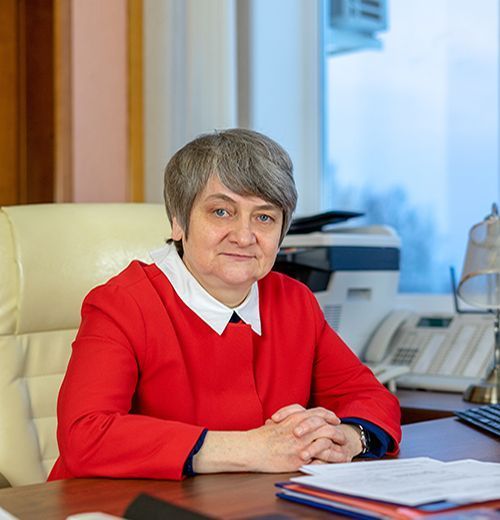Rector's page

Nadezhda Glebovna Yarushkina
Rector of Ulyanovsk State Technical University, Doctor of Technical Sciences, Professor, Honorary Worker of Higher Professional Education of the Russian Federation, Honored Professor of Ulyanovsk State Technical University, Deputy Chairman of the Public Expert Council for the Development of Information Technologies under the Governor of the Ulyanovsk Region, Member of the Presidium of the Regional Political Council of the United Russia Party.
History
In 1984, Nadezhda Yarushkina graduated from the Ulyanovsk Polytechnic Institute with a degree in Electronic Computers. In 1990 she defended her Ph.D. thesis on the topic "Research of tools for organizing and embedding a dialogue in problem-oriented systems", and in 1998 - a doctoral dissertation on the topic "Computer-aided design of complex technical systems under uncertainty". In 1999 she received the degree of Doctor of Technical Sciences. Since 1997 - Head of the Department of Information Systems at the Faculty of Information Systems and Technologies, since 2006 - Vice-Rector for Research, since 2015 - First Vice-Rector - Vice-Rector for Research. From October 2019 to July 2020 she was the interim rector of UlSTU. In 2017, she was elected to the Public Chamber of the Ulyanovsk Region.
About scientific works
The subject of scientific works of Professor Nadezhda Yarushkina includes computer-aided design systems, artificial intelligence. She is also the creator of a new scientific direction in the field of fuzzy and hybrid intelligent systems. She developed the theory of soft expert systems and time series mining systems. Under her scientific supervision, the Department of Information Systems carries out a significant amount of fundamental and applied scientific research on the problems of artificial intelligence, which have found application in industry. In recent years, research has been carried out with the support of grants from the Russian Foundation for Basic Research within the framework of major scientific projects carried out under contracts with high-tech enterprises.
About teaching experience
Nadezhda Yarushkina is actively training scientific personnel through doctoral and postgraduate studies. Under her leadership, 3 doctors of science and 20 candidates of technical sciences were trained. She is the chairman of the dissertation council at UlSTU 212.277.01 and a member of the dissertation council 212.278.02 at Ulyanovsk State University. Nadezhda Yarushkina - expert of the Russian Foundation for Basic Research (RFBR), member of the RFBR Expert Council on regional and interdisciplinary competitions, Chairman of the RFBR Expert Council on regional competitions of the Ulyanovsk region, active participant in scientific professional communities: member of the Fuzzy Systems Technical Committee (FSTC), the Computational Intelligence Society (CIS) of the Institute of Electrical and Electronic Engineers, Inc. (IEEE); member of the International Fuzzy Systems Association (IFSA), member of the Russian Association of Artificial Intelligence, ex-president of the Russian Association of Fuzzy Systems and Soft Computing.

About future plans
Under the leadership of Nadezhda Yarushkina, a strategic program for the development of UlSTU for 2017–2021 has been developed and is being implemented. Also, under her scientific supervision, a successfully implemented Strategy for the Development of the Industry of Information and Communication Technologies and Electronics of the Ulyanovsk Region for 2015-2020 and a new Strategy for the Development of the Industry of Information and Digital Technologies in the Ulyanovsk Region for 2020-2030, taking into account the tasks of the digital transformation of the region, were developed.
During the performance of her duties as rector, Ulyanovsk State Technical University joined the consortium of the scientific and educational center "Engineering of the Future". Also, on the initiative of Nadezhda Yarushkina, UlSTU takes an active part in the formation of the program of activities of the world-class scientific and educational center for the alternative energy industry (REC) of the Ulyanovsk region. The megaproject "Smart Campus and Digital University Ecosystem" (2020-2022) has been developed and is being successfully implemented.